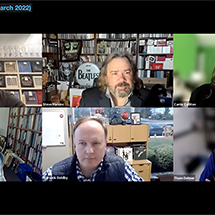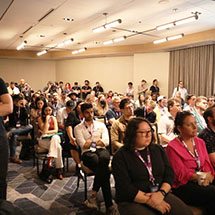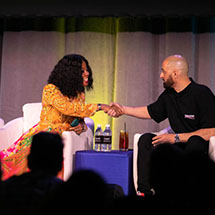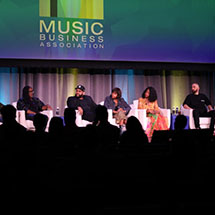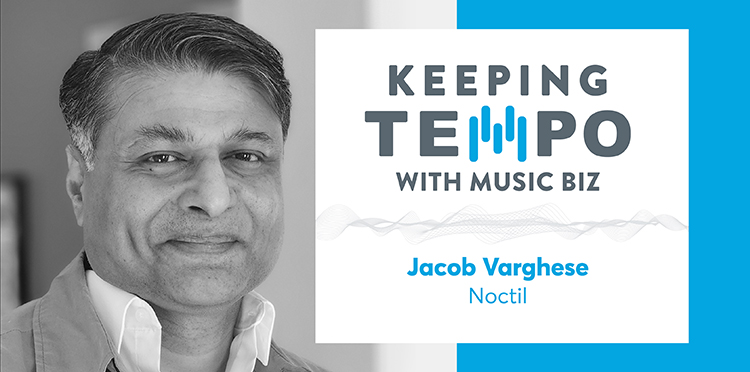
[Keeping Tempo With Music Biz] — Improving Metadata Management For All: An Interview with Noctil’s Jacob Varghese

Metadata continues to be a hot-button issue for the music industry, given its important role in ensuring that artists & rightsholders are properly paid when their works are streamed or purchased. In this conversation with Noctil Founder and Director, Jacob Varghese, we talk about some of the ways his company is streamlining & democratizing metadata processing tools for artists & music companies of all sizes, the applications & benefits of new AI tech in the metadata sector, the advantages of metadata being platform-agnostic, and more!
Music Biz: Can you give us some background on Noctil’s origins and what has brought the company to where it is today?
Jacob Varghese: The company was set up with the aim of keeping artistic creativity alive by ensuring rightsholders are paid for their work. Music is one of humanity’s most universal ways of expression that is ever-present in the lives of people of all countries, ages and cultures around the globe. We truly believe that music has the power to transform lives and change the world. That is why Noctil aims to help musicians continue to create more powerful music and ensure that they are paid for their deserved rights, keeping artistic creativity alive.
Remuneration in the music and audiovisual industries is an important topic that should have an easy solution. Unfortunately, this is not the case. Before starting Noctil, I worked with and saw various music organizations in the areas of rights management and neighboring rights, each reinventing the wheel to solve how music metadata is exchanged and matched. Some organizations have resources to improve efficiency, but in most cases, they need more resources and time. Inefficient systems and processes prevent most agencies from collecting and distributing money to their full potential.
This is why I started Noctil: to bring technological advancements like Artificial Intelligence (AI), Machine Learning (ML) and Cloud computing to these organizations by solving their common and challenging problems in a commercially viable and affordable way.
Music Biz: Noctil’s motto is “Metadata Management Made Easy” — what does that mean to you, and how does it translate to the end-user experience?
JV: We designed our platform to be industry-agnostic, recognizing that effective metadata management, data transformation, advanced matching and entity resolution are critical to driving better business outcomes across many sectors. High-quality metadata plays a vital role in everything from healthcare and legal to IT and telecom. In industries like music and audio-visual, it becomes even more crucial as it underpins remuneration, copyright protection, discovery, customer experience and auditing processes.
Our services cater to a wide range of clients in the entertainment industry, including publishers, labels, administrators, and rights management agencies in the entertainment industry, though we extend beyond this sector as well. By simplifying metadata management, we enable our customers to efficiently process and exchange data across industry stakeholders and standards. Our next-generation metadata matching and calculation engine is highly configurable, allowing clients to achieve optimal business results quickly and cost-effectively.
Music Biz: Does the “no-code” nature of Noctil’s platform give its users any advantages over traditional metadata solutions?
JV: The Noctil platform is a faster and more reliable solution with less upfront cost, is scalable and offers continuous tech improvement at an affordable cost. It’s basically an all-in-one platform for all your metadata needs in the music and audiovisual industries. Our platform can ingest metadata from any source and any format, transform it into the right format and ensure you have high-quality metadata.
By being a no-code platform, organizations can adapt it to their own in-house models without needing complex backend development. With Noctil, organizations experience 4x faster implementation, a reduction in costs by up to 80%, a 98% increase in royalty payouts and an increase in metadata accuracy by up to 98%.
Music Biz: Noctil’s platform has been used by publishers, record labels, and rights societies — how are your offerings for each of these communities similar and dissimilar to each other?
JV: In the music industry, each segment focuses on distinct types of rights and data, reflecting their specific needs and objectives. Publishers concentrate on Musical Works and the associated rights, while Labels prioritize Sound Recordings and related Master rights. Music licensing agencies, on the other hand, are tasked with licensing and collecting specific rights on behalf of their members. These varied focal points translate into vastly different use cases across the industry.
This is where the versatility and strength of our platform come into play. At its core, we developed a robust and adaptable platform. Building on this foundation, we designed modular solutions tailored to address the unique challenges of each segment. The modular nature allows for a seamless plug-and-play approach, enabling us to integrate different modules to tackle some of the industry’s most pressing issues.
One such example is our matchIQ matching engine, a versatile tool that serves various segments by identifying patterns and matches for usage tracking and auditing revenue reports. For music licensing companies, our platform modernizes their tech stack by supporting critical processes such as matching, de-duplication, data transformation, integration, automation workflows and distribution engines. This modernization enhances efficiency and accuracy throughout their operations.
Meanwhile, Publishers and Labels leverage our platform to streamline the registration and exchange of rights data, conduct thorough audits of revenue streams, and analyze trends to ensure maximized global revenue. By addressing these diverse requirements through innovative, modular solutions, our platform empowers the music industry to operate more efficiently and effectively, fostering growth and collaboration across all segments.
Music Biz: In working with these communities, has feedback from labels, publishers and music rights societies led to changes in how Noctil’s platform operates; and if so, how?
JV: What we offer today is the result of continuous collaboration and feedback from our customers. Over the past eight years, we have twice returned to the drawing board to redesign everything from scratch. In 2016, after years of industry experience, we identified the need for a new approach to matching and identification solutions, powered by modern technologies like ML and AI. Our first iteration emerged in response to an RFP for a matching solution.
To address diverse entity resolution use cases, we reimagined and redesigned our approach, resulting in the creation of a no-code platform configurable to meet highly specific requirements. Every feature built atop our platform stems from customer needs and feedback. We remain committed to continuously improving, optimizing, and refreshing our solutions to stay ahead of industry demands.
Music Biz: AI and ML applications have been on the minds of every music industry professional this past year. What particular benefits has integrating this new tech had for your platform?
JV: At Noctil we’re focused on using AI to improve the way an artist’s work is tagged, cataloged, and exchanged with various music organizations. This is essential in today’s digital age, where music is streamed and downloaded from all over the world. By using AI to ensure that music is accurately tagged with the right metadata, we can make it easier for record labels, music rights organizations, distributors, and collecting societies to ensure that artists are properly credited for their work. This in effect helps music rightsholders maximize their revenues and get artists paid for the use of their work.
The integration of AI/ML technologies into our stack has delivered three significant outcomes:
- Enhanced Operational Efficiency: By eliminating the need to manage and maintain complex rules, we’ve streamlined processes and reduced manual overhead.
- Improved Accuracy: Our solutions have demonstrated a 15% to 20% improvement in accuracy compared to traditional and legacy systems.
- Continuous Learning and Optimization: Automation powered by AI/ML enables continuous learning from data and decisions, further refining and optimizing overall processes over time.
Music Biz: More broadly, how do you see AI & ML technologies improving the behind-the-scenes processes that make the music business as a whole run?
JV: I think that AI is playing a bigger role in the music industry than people realize. AI has been in action long before the words “generative AI,” “OpenAI” and “ChatGPT” made headlines. Algorithms – or “recommendation engines” – that recommend new music and movies, display relevant ads on social media, or an Uber nearby – these are all powered by algorithms that are based on data science. Through AI, DSPs and other platforms can improve the user experience and match their listening habits with new, undiscovered music. DSPs analyze audio features, metadata, and user interactions to recommend songs or artists matching a particular mood, tempo, or style and offer personalized recommendations.
Music Biz: Over the past decade, we at Music Biz have heard that access to fundamental knowledge on the importance of clean metadata has been the biggest barrier to ensuring a clean supply chain for the entire industry. Do you see this as the case still in 2024, going into 2025 and, if not, what is the biggest hurdle our industry needs to clear in that regard?
JV: While awareness of clean metadata’s importance has improved, challenges persist. The biggest hurdle now is likely adopting scalable, interoperable, and automated solutions to manage metadata across increasingly complex global supply chains. Despite a broader understanding, many organizations still grapple with outdated systems, fragmented data standards, and limited integration capabilities between stakeholders.
Moving forward in 2025 and beyond, we need to focus on expanding knowledge and best practices for metadata management to all levels of stakeholders, driving alignment on universal metadata standards to ensure compatibility and seamless data exchange, and encouraging the use of platforms and tools that leverage AI/ML to automate data validation, deduplication, and reconciliation processes.
Music Biz: Looking to the future, what opportunities or challenges in the music metadata space make you optimistic about 2025 and beyond?
JV: Metadata volume and complexity are set to expand with the emergence of new platforms, diverse exploitation opportunities, global markets, and the growing use of music from underrepresented regions. Additionally, legislative and policy shifts to support innovative business models in generative AI, alongside the convergence of music, movies, gaming, and social media, further amplify the need for advanced metadata solutions.
Noctil is well-positioned to address these challenges by enabling complex, cross-industry metadata management, ensuring compliance, fostering trust, and delivering multilingual, culturally adaptive solutions. Fragmented standards and inconsistent adoption across the industry present barriers to unified systems, but Noctil’s user-friendly tools can simplify and standardize diverse metadata formats effectively.
By remaining agile and innovative, Noctil can maintain its leadership in this dynamic space. A focus on interoperability, cutting-edge technology integration, and user-centric design will empower the platform to thrive and adapt. Its established reputation as a no-code metadata leader provides a strong foundation for overcoming challenges and capitalizing on emerging opportunities.
Music Biz: And as a whole, what trends, tech or industry happenings do you expect will help define the music business in the year to come?
JV: AI and generative AI will continue being a big topic. While some industry players view AI as a threat, others recognize its potential to revolutionize the music business. And don’t get me wrong – I fully understand why music companies do not want to license content for AI training. The potential for copyright infringement is still high and music works shouldn’t be used without a proper license. The use of a music work by an AI model should still be properly credited and most importantly remunerated to the rightsholder and artist. Music shouldn’t be used for free.
At the moment, government regulations (especially in Europe) are more beneficial for AI companies, rather than music companies. The current General TDM Exemption requires each rightsholder to opt out of each song and musical work. It creates technical and practical challenges to implement from both sides.
Nonetheless, I believe there is a way forward. This includes AI companies and the music industry working together to create a pathway to build a business model around it that benefits all parties. A new licensing model may evolve in the coming years that is specific to AI companies, one that is simplified for specific AI use cases that do not require individual copyrights from various parties.
You can read past Keeping Tempo articles via the portal linked here. And, stay tuned for more insightful discussions from our members and partners from across the industry!

